

The Human Clock™: 2:25am. Web.mit.edu/esd.83/www/notebook/Complexity.PDF. Simplexity. Simplexity is an emerging theory that proposes a possible complementary relationship between complexity and simplicity.
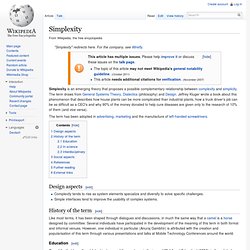
The term draws from General Systems Theory, Dialectics (philosophy) and Design. Jeffrey Kluger wrote a book about this phenomenon that describes how house plants can be more complicated than industrial plants, how a truck driver's job can be as difficult as a CEO's and why 90% of the money donated to help cure diseases are given only to the research of 10% of them (and vice versa).
The term has been adopted in advertising, marketing and the manufacture of left-handed screwdrivers. Design aspects[edit] Complexity tends to rise as system elements specialize and diversify to solve specific challenges.Simple interfaces tend to improve the usability of complex systems. History of the term[edit] Like most terms, it has been shaped through dialogues and discussions, in much the same way that a camel is a horse designed by committee.
Education[edit] In science[edit] References[edit] Activités - Chaire Edgar Morin de la Complexité. Le programme des activités de la chaire Edgar Morin de la Complexité doit permettre : d’interroger le sens de la complexité du point de vue des disciplines de gestion et de quelques problématiques directrices des préoccupations de l’ESSEC (entrepreneuriat, business in society, etc).d’expliciter les enjeux de l’appréhension d’un environnement interne et externe complexe pour les praticiensexaminer les méthodes d’approche et de traitement de la complexité sur le terrainde considérer les qualités, compétences, savoir-faire requis pour gérer la complexité au sein des organisations sur les plans du management et du leadership individuel et collectif Quelques activités de la chaire dans ce contexte : les « Mises en boîtes » : présentation par des professeurs de l'ESSEC de leur vision et compréhension de la complexité au travers de certains de leurs résultats de recherche.
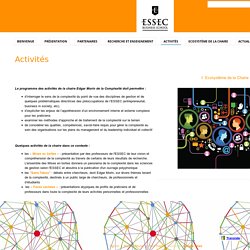
Why we need to rethink education in the artificial intelligence age. Energy transition and co-operative education and training - On Society. (Image by rawpixel from Pixabay, CC0) While traditionally the integration of theory and practice is routine in vocational education, in tertiary education theoretical education is often separated from practice.

After all graduates shall satisfy requirements in jobs and society. This is often not the case due to a lack of exchange between theory and practice during education. In contrast to classical education formats co-operative learning approaches offer alternative opportunities to solve this problem. Our research questions how co-operative formats can be defined and discusses which barriers and innovative values each format entails. 'My company has gone fully remote and I'm despairing': who wins in the new world of working from home?
I am 20 minutes into my scheduled 30-minute call with Shivani Maitra when I start to freeze.

Maitra, a partner at global consultancy firm Deloitte, is leading the firm’s post-Covid-19 research into the future of work, and is giving me a seamless analysis of what business is about to look like: more autonomy, more remote work, happier workers, more accessible leadership – all facilitated by technology. But I can’t get Skype for Business to function. It’s a hot day and the connection comes and goes, leaving me contorted and sweating over my laptop. Too complex to exist - The Boston Globe. ON . 10, 1996, a single power line in western Oregon brushed a tree and shorted out, triggering a massive cascade of power outages that spread across the western United States. Frantic engineers watched helplessly as the crisis unfolded, leaving nearly 10 million people without electricity. Even after power was restored, they were unable to explain adequately why it had happened, or how they could prevent a similar cascade from happening again - which it did, in the Northeast on Aug. 14, 2003.
Over the past year we have experienced something similar in the financial system: a dramatic and unpredictable cascade of events that has produced the economic equivalent of a global blackout. As governments struggle to fix the crisis, experts have weighed in on the causes of the meltdown, from excess leverage, to lax oversight, to the way executives are paid. ParadigmOfComplexity. The last few decades have seen the emergence of a growing body of literature devoted to a critique of the so-called “old” or “Cartesian-Newtonian” paradigm which, in the wake of the prodigious successes of modern natural science, came to dominate the full range of authoritative intellectual discourse and its associated worldviews.
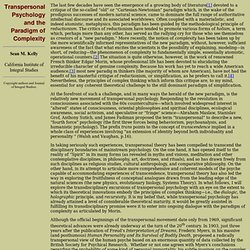
Often coupled with a materialistic, and indeed atomistic, metaphysics, this paradigm has been guided by the methodological principle of reductionism. The critics of reductionism have tended to promote various forms of holism, a term which, perhaps more than any other, has served as the rallying cry for those who see themselves as creators of a “new paradigm.” At the forefront of such a challenge, and in many ways the herald of the new paradigm, is the relatively new movement of transpersonal psychology. In taking seriously such experiences, transpersonal theory has been compelled to transcend the disciplinary boundaries of mainstream psychology. C. Studies in Complexity. Home Relational Science and Holistic Analysis Our goal for this Relational Science site is to build a basic synthesis of relational complexity on the foundations developed by Robert Rosen.
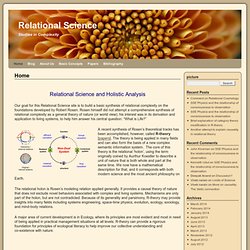
Complexity Science. From Systems Thinking to Systems Being. A system is a set of interconnected elements which form a whole and show properties which are properties of the whole rather than of the individual elements.
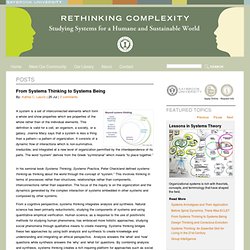
This definition is valid for a cell, an organism, a society, or a galaxy. Joanna Macy says that a system is less a thing than a pattern—a pattern of organization. It consists of a dynamic flow of interactions which is non-summative, irreducible, and integrated at a new level of organization permitted by the interdependence of its parts. The word “system” derives from the Greek “synhistanai” which means “to place together.” In his seminal book Systems Thinking, Systems Practice, Peter Checkland defined systems thinking as thinking about the world through the concept of “system.”
From a cognitive perspective, systems thinking integrates analysis and synthesis. Mental Model Musings. PLOS Pathogens: Systems Biology for Biologists. Citation: Hillmer RA (2015) Systems Biology for Biologists.
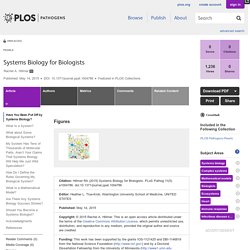
PLoS Pathog 11(5): e1004786. doi:10.1371/journal.ppat.1004786 Editor: Heather L. True-Krob, Washington University School of Medicine, UNITED STATES Published: May 14, 2015. How the size of networks can skyrocket The growth process of networks.
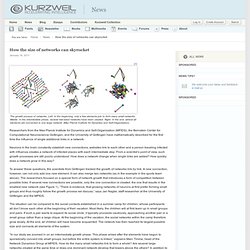
Left: In the beginning, only a few elements join to form many small networks. Middle: In the intermediate phase, several mid-sized networks have been created. Right: In the end, almost all elements are connected in one large network. The Human Genome Is Far More Complex Than Scientists Thought. The Art of Complex Problem Solving. - Glossary of Terms. Category: Resources Posted by: Aaron and Ken The following definitions are brief, loose, and approximate.
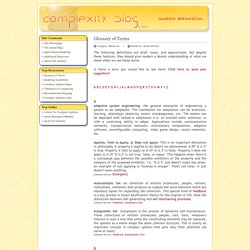
Human Systems Dynamics. Complexity: It’s Not That Simple. Complexity theory has been around for a generation now, but most people don’t understand it. I often read or listen to consultants, ‘experts’ and media people who proffer ludicrously simplistic ‘solutions’ to complex predicaments. Since it seems most people would prefer things to be simple, these ‘experts’ always seem to have an uncritical audience. Because most of what’s written about complexity theory is dense, academic and/or expensive, I thought I’d try to summarize the key points of complexity theory (focusing on the social/ecological aspects of it, not the mathematical/scientific ones) using lots of examples for clarity, and in a way that might be used practically by those grappling with complex issues and challenges.
ViewPort. Self Organization. Crazy Vietnam crossroad. Mist. Erudite. Esoterica. Evolving. Genomic Insights. MEDICA. PhiloSophia. COVID19 SARS-CoV-2. Computational. Artificially Intelligent. Codification. Gamification. Mathematical.
Quantum. Quantum Playground. SCIENCE Wise. Complex Systems. Global Theories. Complex Systems. On the Changing Nature of Work & Society.